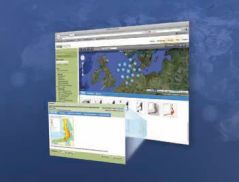Scientific research helps oil and gas exploration
The Geological Society of London has contributed its geological maps to Geofacets, Elsevier's tool that brings scholarly research resources to the oil and gas industry. Sian Harris finds out why

A wealth of resources from the Geological Society of London have been added to Elsevier’s Geofacets tool to help serve the oil and gas industry better with research resources.
Geofacets, which was launched in 2010, is a web-based database of georeferenced geological maps that enables geoscientists to explore data via an interactive map interface. Results can be refined by geological basin, map type and map surface area.
Geofacets has been developed particularly with industrial researchers in mind. ‘In the oil and gas market in general you see less use of academic research papers than among academic researchers,’ noted Friso Veenstra, the company’s director of market development – oil and gas. He believes that access to research resources is becoming increasingly important in this industry as the process of finding oil becomes more complex and expensive. Once a company has started to drill, it can cost hundreds of thousands to millions of dollars per day, so resources that help quickly find the right places to drill are very valuable.
Elsevier publishes around a third of all the research published in this area, which, as Veenstra points out, is a sizeable proportion of – but not all – the available content. This is why the Geofacets team within the company began to look for other content to include. The Geological Society of London is the first of what Elsevier hopes will be a series of such partnerships. The collaboration brings together over 165,000 geological maps from Elsevier’s top earth science journals and the society’s well-known Lyell Collection.
‘It is important to customers to have access to more academic information,’ said Veenstra. ‘We’ve established that the corporate sector is still under-using academic information, so it’s important to present it to them in an easier and more accessible way, while offering as much content as possible. The Geological Society of London has very highly-regarded content, and adding this to Geofacets makes the tool much more valuable for our customers.’
Working with competing publishers in this area – especially if one is a large commercial publisher and the other is a learned society – is not everyday practice. So, in that sense, the addition of the society’s content to an Elsevier’s product is ‘a very big and special step and required a mindset change,’ said Veenstra.

Geofacets enables researchers in the oil and gas industry to search essential geological maps
So how does the arrangement work? ‘Elsevier has developed the Geofacets tool and it will remain our product. The Geological Society of London content is a separate module within Geofacets’ he explained.
‘This agreement will help Geofacets customers access more information and help the society distribute their content as widely as possible. Although the society already has many corporate links, there is a wider market that they can reach through this tool.’
‘What we do as geologists has little value unless we make it as widely accessible as possible,’ explained Edmund Nickless, executive secretary of the Geological Society at the launch of the new module. ‘As the oldest national geological society in the world, our challenge has always been how best to share our knowledge and understanding of the Earth. So when we learned about Geofacets from our colleagues at Elsevier, we recognised the value of this collaboration.’
The partnership between the society and Elsevier will go beyond Geofacets: ‘It’s not just about content building but developing partnerships,’ observed Veenstra.
And for Geofacets there are further plans too. ‘We hope to sign more partnerships. Even if you are the biggest publisher in an area, you need to include more content to serve the customer well. This is really the start of very many conversations,’ he concluded.






